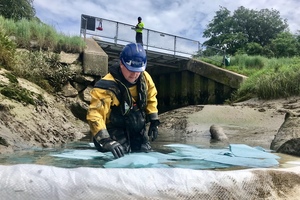Devon and Cornwall homeowners urged to check their oil tanks
Press release
The Environment Agency is urging people to check their oil tanks for leaks to protect the environment and reduce the risk of potentially large financial losses.

Heating oil can escape into watercourses and threaten wildlife and water quality
Over the past 3 months 32 oil-related incidents were reported to the Environment Agency in Devon and Cornwall – a 50% rise from the same period last year.
With the recent cold weather, many households – particularly in rural areas – have been using their heating more. Second homes in the area will also not have had their oil tanks used or inspected recently due to lockdown travel restrictions. But cold weather can weaken joints and damage underground pipes.
Senior Environment Officer Brian Grant said:
Oil pollution is one of the most common problems recorded by the Environment Agency and across Devon and Cornwall it is on the increase.
Not only can heating oil affect our aquifers it can also have major impact in our rivers and streams and harm fish, birds and aquatic life. Not only is the cost of losing the oil expensive, clean-up costs can be large and often not covered by household insurance.
Leaked oil can end up in drains, many of which lead directly to rivers, streams, lakes and even garden ponds, having the same effect as pouring it directly into the watercourse. It can also pose a risk to aquifers. In East Devon one aquifer supplies water to about 250,000 people.
Oil is poisonous to fish and other wildlife and smothers plants – just 2 litres of oil could seriously pollute the volume of fresh water needed to fill an olympic-sized swimming pool.
Householders with domestic oil tanks should take the following action to ensure they are safe for use:
- Position tanks as far away as possible from drains, streams and ponds.
- Inspect tanks, pipes and other equipment for leaks, damage and interference once a week. Any problems should be fixed as soon as possible by an Oil Firing Technical Association (OFTEC) technician.
- Arrange for the boiler and tank to be serviced at least once a year by an OFTEC technician. This should include any underground pipe work.
- Monitor how much oil you use. If the volume of oil being used suddenly increases, there could be a leak.
- Supervise oil deliveries. Never allow your tank to be overfilled and don’t order more oil than you can safely store.
- Check your home insurance covers clean-up costs on both your property and neighbouring land. Always notify insurers immediately in the event of a spill or suspected spill.
- If a tank starts leaking, you should try to stop the oil soaking into the ground or going down drains. Contact your insurance company to arrange for an OFTEC technician or UKSpill accredited clean-up company to attend.
- Secondary containment, such as a bund, will prevent oil from escaping into the environment if a leak occurs. This is a legal requirement for domestic tanks which store more than 3,500 litres.
To report an oil spill or leak, contact the Environment Agency’s 24-hour emergency hotline on 0800 80 70 60. There is more guidance on the oil care campaign website at http://oilcare.org.uk/.
Published 1 March 2021